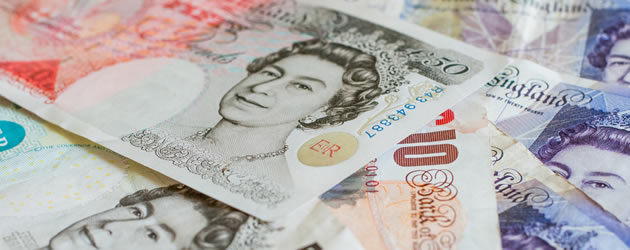Demand for the Pound (GBP) has remained limited today after UK Average Weekly Earnings were found to have declined sharply, while the Euro (EUR) remains bullish despite the approaching Fed interest rate decision.
Euro (EUR) Dominant after Strong Eurozone Economic Sentiment Surveys
It was a relatively weak start to the week for Pound Sterling (GBP) as investors were deterred from buying into the currency by concerns that the UK’s housing market remains in an increasingly fragile bubble. This impression was not helped along by the revelation that house price inflation has risen to 7% over the last year. Although the November Consumer Price Index showed a more optimistic uptick from -0.1% to 0.1% this improvement in baseline inflation was not enough to prompt a sustained rally for the Pound. Pundits remain largely convinced that domestic inflation will continue to hover in the region of 0% for some months to come, with a lack of progress towards the Bank of England’s (BoE) target of 2% suggesting that an interest rate rise is still some way distant.
A stronger set of ZEW Economic Sentiment Surveys bolstered demand for the Euro (EUR) yesterday, as confidence both in Germany and the wider Eurozone rose. Thus, in spite of the continued dovishness of European Central Bank (ECB) policymakers as well as European Commission President Jean-Claude Juncker, the single currency trended higher against the Pound.
Pound (GBP) Bearish after UK Average Weekly Earnings Slump, Odds of Near-Term BoE Hike Decline
The latest round of Eurozone PMIs proved a little more mixed, with growth in manufacturing output contrasted by an unexpectedly sharp slowdown in the service sector. In particular the French Services PMI dropped from 51.0 to 50.0, showing stagnation as it touches the neutral baseline between industry expansion and contraction. This poorer showing can largely be attributed to the aftermath of the Paris terror attacks, and has generally failed to dent the appeal of the Euro today.
On the other hand, the UK’s latest set of employment data offered limited incentive to buy into Sterling. While the ILO Unemployment Rate defied expectations to drop from 5.3% to 5.2% in the three months to October this more bullish result was offset by a significant slump in Average Weekly Earnings. As Bank of England (BoE) policymaker Minouche Shafik recently asserted that further wage growth was required before she would vote for an interest rate hike it increasingly seems like the BoE will not begin tightening monetary policy in the near future.
GBP/EUR Exchange Rate Forecast: FOMC Rate Decision May Weigh on Euro
Fresh volatility could be in store for the single currency this evening, however, as the Federal Open Market Committee (FOMC) makes its final interest rate decision of 2015. Should the Fed opt to make a more dovish interest rate increase, indicating a slower pace of hikes over the coming year, the Euro could well see further buoyancy.
The Pound is unlikely to rally ahead of the weekend, as tomorrow’s November Retail Sales are forecast to have seen a slump in consumer demand on the year. If the results surprise on the upside, though, Sterling may see a resurgence in confidence.
Current GBP, EUR Exchange Rates
At time of writing, the Pound Sterling to Euro (GBP/EUR) exchange rate was slumped in the region of 1.3743, while the Euro to Pound Sterling (EUR/GBP) pairing was making gains around 0.7278.



